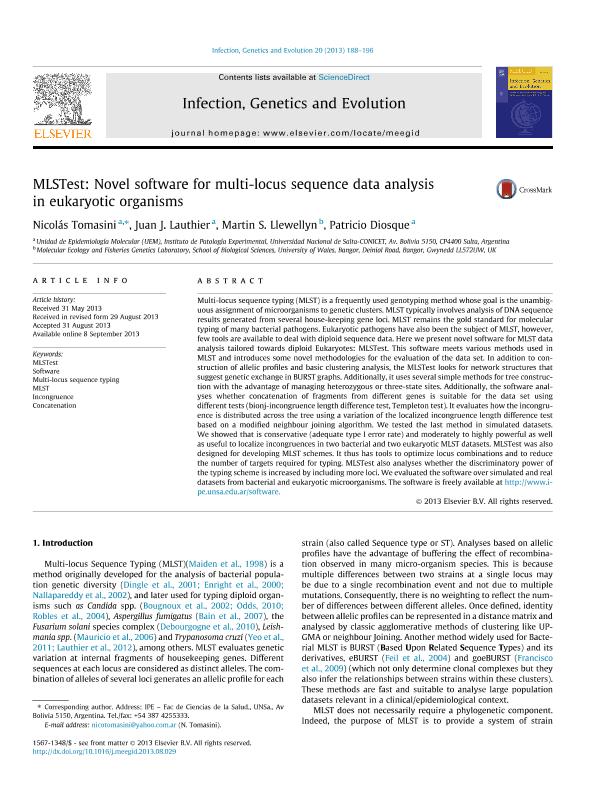Mostrar el registro sencillo del ítem
dc.contributor.author
Tomasini, Nicolás

dc.contributor.author
Lauthier, Juan José

dc.contributor.author
Llewellyn, Martin S.
dc.contributor.author
Diosque, Patricio

dc.date.available
2016-09-13T21:19:57Z
dc.date.issued
2013-09-08
dc.identifier.citation
Tomasini, Nicolás; Lauthier, Juan José; Llewellyn, Martin S.; Diosque, Patricio; MLSTest: Novel software for multi-locus sequence data analysis in eukaryotic organisms; Elsevier Science; Infection, Genetics And Evolution; 20; 8-9-2013; 188-196
dc.identifier.issn
1567-1348
dc.identifier.uri
http://hdl.handle.net/11336/7619
dc.description.abstract
Multi-locus sequence typing (MLST) is a frequently used genotyping method whose goal is the unambiguous assignment of microorganisms to genetic clusters. MLST typically involves analysis of DNA sequence results generated from several house-keeping gene loci. MLST remains the gold standard for molecular typing of many bacterial pathogens. Eukaryotic pathogens have also been the subject of MLST, however, few tools are available to deal with diploid sequence data. Here we present novel software for MLST data analysis tailored towards diploid Eukaryotes: MLSTest. This software meets various methods used in MLST and introduces some novel methodologies for the evaluation of the data set. In addition to construction of allelic profiles and basic clustering analysis, the MLSTest looks for network structures that suggest genetic exchange in BURST graphs. Additionally, it uses several simple methods for tree construction with the advantage of managing heterozygous or three-state sites. Additionally, the software analyses whether concatenation of fragments from different genes is suitable for the data set using different tests (bionj-incongruence length difference test, Templeton test). It evaluates how the incongruence is distributed across the tree using a variation of the localized incongruence length difference test based on a modified neighbour joining algorithm. We tested the last method in simulated datasets. We showed that is conservative (adequate type I error rate) and moderately to highly powerful as well as useful to localize incongruences in two bacterial and two eukaryotic MLST datasets. MLSTest was also designed for developing MLST schemes. It thus has tools to optimize locus combinations and to reduce the number of targets required for typing. MLSTest also analyses whether the discriminatory power of the typing scheme is increased by including more loci. We evaluated the software over simulated and real datasets from bacterial and eukaryotic microorganisms. The software is freely available at http://www.ipe.unsa.edu.ar/software.
dc.format
application/pdf
dc.language.iso
eng
dc.publisher
Elsevier Science

dc.rights
info:eu-repo/semantics/openAccess
dc.rights.uri
https://creativecommons.org/licenses/by-nc-nd/2.5/ar/
dc.subject
Mlstest
dc.subject
Mlst
dc.subject
Incongruence
dc.subject
Concatenation
dc.subject
Scheme Optimization
dc.subject
Multilocus Sequence Typing
dc.subject
Software
dc.subject.classification
Epidemiología

dc.subject.classification
Ciencias de la Salud

dc.subject.classification
CIENCIAS MÉDICAS Y DE LA SALUD

dc.title
MLSTest: Novel software for multi-locus sequence data analysis in eukaryotic organisms
dc.type
info:eu-repo/semantics/article
dc.type
info:ar-repo/semantics/artículo
dc.type
info:eu-repo/semantics/publishedVersion
dc.date.updated
2016-08-04T17:22:12Z
dc.journal.volume
20
dc.journal.pagination
188-196
dc.journal.pais
Países Bajos

dc.journal.ciudad
Amsterdam
dc.description.fil
Fil: Tomasini, Nicolás. Consejo Nacional de Investigaciones Científicas y Técnicas. Centro Científico Tecnológico Salta. Instituto de Patología Experimental; Argentina. Universidad Nacional de Salta; Argentina
dc.description.fil
Fil: Lauthier, Juan José. Consejo Nacional de Investigaciones Científicas y Técnicas. Centro Científico Tecnológico Salta. Instituto de Patología Experimental; Argentina. Universidad Nacional de Salta; Argentina
dc.description.fil
Fil: Llewellyn, Martin S.. University of Wales. School of Biological Sciences; Reino Unido
dc.description.fil
Fil: Diosque, Patricio. Consejo Nacional de Investigaciones Científicas y Técnicas. Centro Científico Tecnológico Salta. Instituto de Patología Experimental; Argentina. Universidad Nacional de Salta; Argentina
dc.journal.title
Infection, Genetics And Evolution

dc.relation.alternativeid
info:eu-repo/semantics/altIdentifier/doi/http://dx.doi.org/10.1016/j.meegid.2013.08.029
dc.relation.alternativeid
info:eu-repo/semantics/altIdentifier/url/http://www.sciencedirect.com/science/article/pii/S1567134813003419
Archivos asociados
